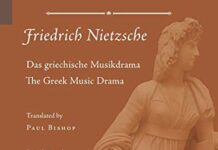
Ebook Info
- Published: 1997
- Number of pages: 332 pages
- Format: PDF
- File Size: 3.90 MB
- Authors: Friedrich Nietzsche
Description
The four short works in Untimely Meditations were published by Nietzsche between 1873 and 1876.They deal with such broad topics as the relationship between popular and genuine culture, strategies for cultural reform, the task of philosophy, the nature of education, and the relationship between art, science and life. They also include Nietzsche’s earliest statement of his own understanding of human selfhood as a process of endlessly ‘becoming who one is’. As Daniel Breazeale shows in his introduction to this new edition of R. J. Hollingdale’s translation of the essays, these four early texts are key documents for understanding the development of Nietzsche’s thought and clearly anticipate many of the themes of his later writings. Nietzsche himself always cherished his Untimely Meditations and believed that they provide valuable evidence of his ‘becoming and self-overcoming’ and constitute a ‘public pledge’ concerning his own distinctive task as a philosopher.
User’s Reviews
Reviews from Amazon users which were colected at the time this book was published on the website:
⭐These four “Meditations” deal with, as has been noted in other reviews, a very diverse number of topics. Primarily, however (and apart from the scattered passages of philosophical interest), they are criticisms, or more accurately explanations, of culture. Although they deal with issues such as sholarship, literature, science, art, and of course philosophy, the recurring theme in all four is culture. What it is, what kind of culture is desirable, how culture comes about, etc. These discussions are found in each of the Meditations, some more fragmentary than in others.These are some of Nietzsche’s early writings and they reflect that fact. They are similar to “The Birth of Tragedy” to certain degrees in style and in content. They are not fully or even primarily philosophical works. Nietzsche is here still under the influence of Richard Wagner and Arthur Schopenhauer and although it can be seen that he is breaking away from those influences (for instance, the Meditation on Schopenhauer does not focus on Schopenhauer’s actual philosophy as a source of education for Nietzsche so much as Schopenhauer the man, and the Meditation on Richard Wagner is not as strong and unified as the other Meditations are and it does not present a wholly flattering picture of Wagner, dwelling as it does on his psychology – it’s tenor is not always one entirely of approval) he has not really begun his philosophizing yet.The other way they show how early on in Nietzsche’s career they are is in the writing itself. While “The Birth of Tragedy” had technical issues even ignoring the philological and philosophical concerns (as amazing a work in aesthetics and culture as it was), these four works do as well. Don’t get me wrong, even in Nietzsche’s first book his command of language shows itself and these are beautifully written pieces in their own right, but neither his first book nor the four Meditations can quite measure up, stylistically, to Nietzsche’s later works like “Twilight of the Idols”.Still, the Meditations are interesting in their own right. “David Straus, the Confessor and the Writer” deals with a number of topics. One of these has to do with faith and doctrines of beliefs. Nietzsche, who used to enjoy reading Strauss’s “Life of Jesus”, blasts Strauss mercilessly (in a way that really hasn’t changed if you happen to watch any TV at all) for putting up his own secular faith in place of religious faith and you can almost hear the unspoken words “Last Man” which Nietzsche would write so contemptuously of in “Thus Spoke Zarathustra”. The fact that Strauss shared similar views on religion as such with Nietzsche mattered little. Strauss, in Nietzsche’s opinion, tried to change the fundamental views of the world (from the supernatural to the material/deterministic) without drawing new conclusions from that. Basically, Strauss was viewed as one of those who saw Darwin and that which he stood for as of great benefit to mankind without realizing the kinds of change such a shift in worldview that implied. Essentially, Strauss represents the type (the Last Man) that has ultimately been victorious, in large parts of the world, over Nietzsche. The kind who shifts his superstitions to material science but keeps the Christian morality, or the Christian conclusions based on that premise (which, because of the shift from afterworld to this world, is no longer a valid premise).Later on, Nietzsche bashes Strauss’s prose, although the final examples of bad German that Nietzsche picked apart in the original are simply cut out of this version because of the translation difficulties. It would be somewhat pointless to hear a German criticism in German _of_ German if it has all been rendered (deliberately badly) into English.”On the Uses and Disadvantages of History for Life” is an interesting piece which points out a central tenet of Nietzsche’s philosophy of life. A thing may only be “good” to the extent that it is life-promoting. This is, I’m pretty sure, the main reason Nietzsche fought so hard against anything he perceived as nihilistic. Nietzsche says in here that to a certain extent, for man to function, he must be “unhistorical”. On the other hand, he applauds the type who can be as historical as possible and still function. Throughout these meditations you get a sense of Nietzsche’s approval of the “higher” or aristocratic type that was to culminate in his conception of the overman.”Schopenhauer as Educator” is, as I have said, not so much about Schopenhauer’s philosophy as it is about the lesson’s Nietzsche took from Schopenhauer’s life. Nietzsche claimed, towards the end of his life, that this essay was not written about Schopenhauer but about himself. While I don’t really buy that, I am inclined to grant, after reading it, that some of the attributes Nietzsche praises in Schopenhauer were either slightly altered or completely fabricated and that Nietzsche was writing into this Meditation things he admired and wished to emulate. For one thing, I don’t think you could really say that Schopenhauer was “cheerful” in any sense of the word. Schopenhauer was a pessimist in more than just a philosophical sense and his writings about anything contemporary or tangible seem bitter (not just the stuff about Hegel).I’ll leave off the final Meditation. It’s not as clear as the others, but there is a lot of interesting cultural commentary, including a very great deal about art and culture. There is one passage I would like to quote as an example: “Wherever ‘form’ is nowadays demanded, in society and in conversation, in literary expression, in traffic between states, what is involuntarily understood by it is a pleasing appearance, the antithesis of the true concept of form as shape necessitated by content, which has nothing to do with ‘pleasing’ or ‘displeasing’ preciesly because it is necessary and not arbitrary.” (Richard Wagner in Bayreuth pg. 216)Although there was a revolt against form in the early part of the 20th Century, like most revolts it made certain gains and was summarily crushed.These Meditations constitute necessary reading for any serious Nietzschean (and I use that term without any sense of irony – if Nietzsche hadn’t wanted adherents he shouldn’t have left any writings, unsystematic or not) and help greatly with a proper understanding of his ideas (which can be misconstrued if you start with later writings and don’t read them analytically).This translation is, of course, excellent and the Cambridge Texts series is about the best on the market right now. Even though I have the paperback editions of Nietzsche’s works the binding is more durable than some hardcover books I have purchased.
⭐Some unexpected highlighting on some of the pages, but not much. Overall, a solid copy of the book.
⭐Perhaps Nietzsche’s most underrated work. Gems like “Schopenhauer as Educator” and other works are well translated in this phenomenal and integral text. A must own for anyone seriously interested in Nietzsche.
⭐I haven’t read it yet; but I’m sure it will be very insightful and enlightening.
⭐Eternal recurrence.
⭐To enter into the spirit of the book, you will have to take it up at the start of the day, not as a form of evening relaxation. And you must be prepared to be called to an entirely new way of life, profoundly different from the one you now lead. Nietzsche offers some of the most persuasive and exquisitely beautiful rhetoric ever crafted to compel minds to forsake pedestrian lives consecrated to sensual pleasure and devote themselves wholeheartedly to the pursuit of intellectual excellence.“In his heart every man knows quite well that, being unique, he will be in the world only once and that no imaginable chance will for a second time gather together into a unity so strangely variegated an assortment as he is: he knows it but he hides it like a bad conscience—why? From fear of his neighbor, who demands conventionality and cloaks himself with it.”One of the most tragic aspects of life is that so many very intelligent men and women fail to develop into truly great intellects, and instead squander their intellectual energy on the concerns of the flesh. The herd of intellect-deniers, even when they don’t point guns at us and try to compel us to abandon our plans to bring our intellectual capacities to fruition, offer vast sums of money to tempt us away from intellectual flourishing into a path useful to the herd. For all but one in thousands, this is enough.“There exists no more repulsive and desolate creature in the world than the man who has evaded his genius and who now looks furtively to left and right, behind him and all about him. … He is wholly exterior, without kernel, a tattered, painted bag of clothes.”Nietzsche has nothing but contempt for America and its mammon worshipping ways. The one exception is Emerson, whom Nietzsche praises for his “intellectual cheerfulness” (Twilight of the Idols § 8.13). It’s hard not to notice parallels between the profound intellectual self-reliance Nietzsche espouses in the third untimely meditation, “Schopenhauer as educator,” and Emerson’s intellectual self-reliance.“We are responsible to ourselves for our own existence; consequently we want to be the true helmsman of this existence and refuse to allow our existence to resemble a mindless act of chance.”“No one can construct for you the bridge upon which precisely you must cross the stream of life, no one but you yourself alone.”The nearly irresistible pressure on the intellect to transform itself into something the herd will appreciate—rather than seeking to perfect itself and contribute to the world what it and it alone can contribute—gives rise to the herd-intellectual, what Nietzsche calls the “Bildungsphilister” or “culture philistine.” The culture philistine comes in contact with others like himself wherever he goes, and imagines that this uniformity constitutes culture. But in fact, complacent pride in being part of a herd is the very opposite of the incessant striving that culture demands.“In order to be able thus to misjudge, and thus to grant left-handed veneration to our classics, people must have ceased to know them. This, generally speaking, is precisely what has happened. For, otherwise, one ought to know that there is only one way of honoring them, and that is to continue seeking with the same spirit and with the same courage.”Nietzsche excoriates his age for its utter hostility to the flourishing of the intellect. The smug culture philistines have founded a system of incestuous self-congratulation that allows them to avoid the arduous task of perfecting their own intellects, instead concentrating on giving an appetizer of culture to students whose true aim is to feast on power and pleasure. The peddlers of culture have made themselves into a commercial guild who consider business and family to be the “earnest” things in life, while the demand of culture, to take up the arrow where the past has left it and throw it further, has been forgotten. Both Schopenhauer and Nietzsche existed outside the academic establishment and were contemptuous of the modern sophists that inhabited it. After excoriating a corrupt “university philosophy,” Nietzsche describes his ideal of the solitary philosopher:“Where there have been powerful governments, societies, religions, public opinions, in short wherever there has been tyranny, there the solitary philosopher has been hated; for philosophy offers an asylum to a man into which no tyranny can force it way, the inward cave, the labyrinth of the heart.”Nietzsche’s solitary philosopher doesn’t try to make his intellect useful to the tyrants (or tyrannical majorities) that happen to rule his age. Instead, he flees inward to save his freedom. The problem is, he can’t help but allow himself to be seen and heard by the herd. And they always misunderstand him. They assume everyone shares their presuppositions and their concerns.It’s worth remembering that Nietzsche quit his professorship at age 35 and lived the rest of his life on a meager disability pension. Although we often find him criticizing ascetics, Nietzsche was certainly willing to suffer for philosophy. This makes a stark contrast with the philosopher-sophists of his time (and ours), who are more concerned with earning their bread by peddling their wisdom than with perfecting and immortalizing their wisdom.R. J. Hollingdale, the translator of this text, led an interesting life. He dropped out of grammar school. He worked as a journalist. He paid his own way in private German lessons. He was a soul of the same stamp as Nietzsche, and an exceptionally qualified interpreter and translator.
⭐Just think how Nietzsche picked apart everything David Friedrich Strauss wrote later in life because he was writing as a popular author feeding pat answers to readers who had some idea of the humor of forbidden reciprocity. Strauss could not understand how Nietzsche had ever crossed his path to produce such a rage that would admit that Strauss, as author of The Life of Jesus Critically Examined was the real Straussian genius, but that man who today is publicly famous as David Friedrich Strauss is a different person carelessly making grammatical errors that show he never knew what he intended to say long enough to write it down. Nietzsche was the kind of scholar who thinks nobody gets his points because nothing in his life approached the kind of reciprocity he heaped on Strauss.
⭐The new notes of this edition of the 1983 Hollingdale translation are very interesting, but they are not referenced by numbers in the text of the translation, so it’s necessary to often check the notes at the end of the book, to see if they pertain to the recently read pages, which is of course tedious…
Keywords
Free Download Nietzsche: Untimely Meditations (Cambridge Texts in the History of Philosophy) 2nd Edition in PDF format
Nietzsche: Untimely Meditations (Cambridge Texts in the History of Philosophy) 2nd Edition PDF Free Download
Download Nietzsche: Untimely Meditations (Cambridge Texts in the History of Philosophy) 2nd Edition 1997 PDF Free
Nietzsche: Untimely Meditations (Cambridge Texts in the History of Philosophy) 2nd Edition 1997 PDF Free Download
Download Nietzsche: Untimely Meditations (Cambridge Texts in the History of Philosophy) 2nd Edition PDF
Free Download Ebook Nietzsche: Untimely Meditations (Cambridge Texts in the History of Philosophy) 2nd Edition




